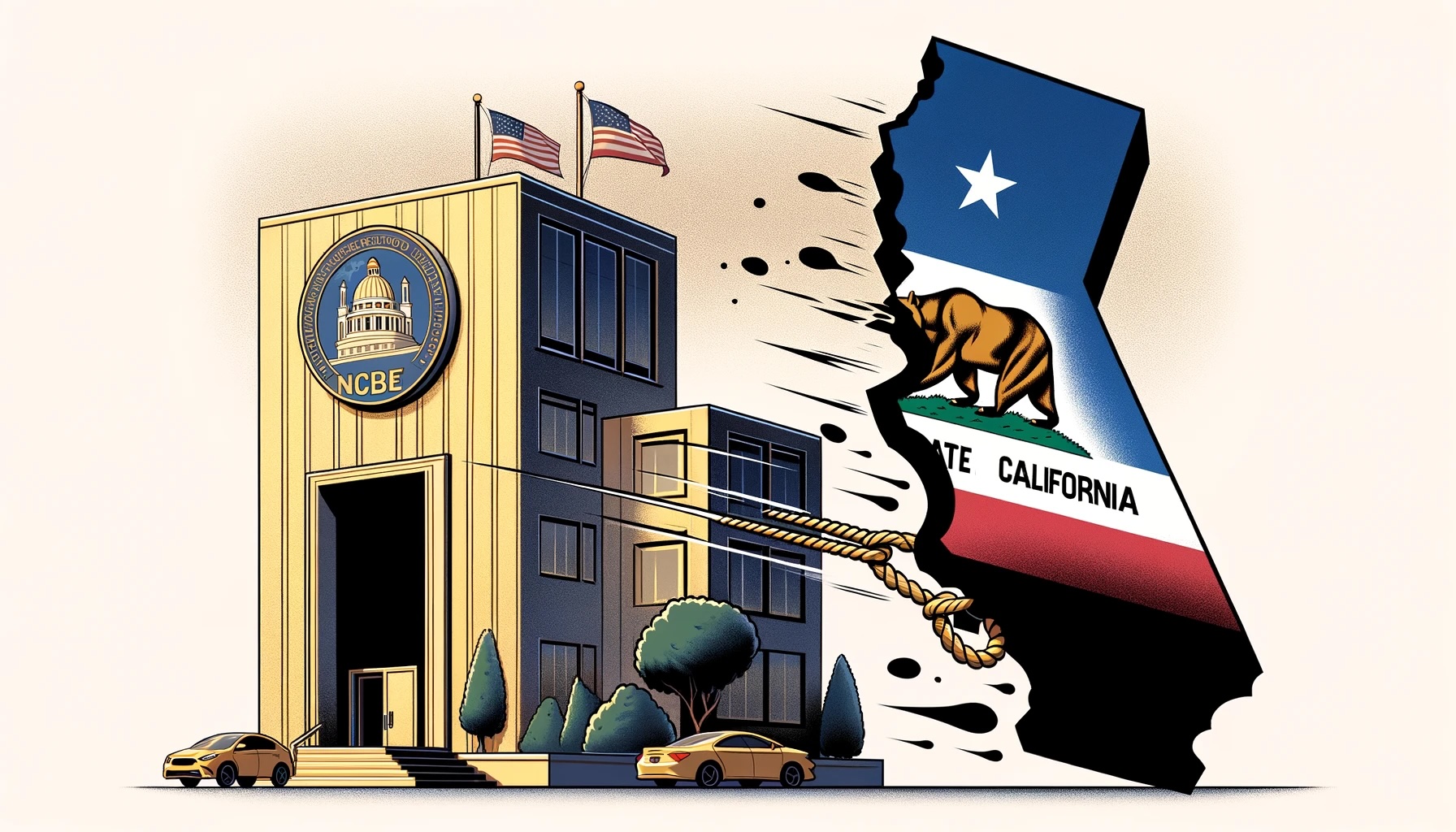June 04 2024, By Pieper Bar Review

Updated June 04 2024. Originally published June 07 2020
New York Requires a Score of 266 on the UBE
The Empire State officially replaced the New York Bar Exam with the Uniform Bar Exam (UBE) back in 2016. 40 other jurisdictions have adopted the UBE in place of state-specific examinations and a passing score in New York is a 266 (out of a possible 400 points).
The UBE is held on the last Tuesday and Wednesday of February and July.
The benefit of the UBE is the portability of your score. Even if you don’t achieve a passing score in the state where you take the UBE, you can transfer it to another jurisdiction with lower passing requirements.
For example, the passing score in Rhode Island is 270. If an examinee earns a 269 in Rhode Island, they could transfer that score to New York, but would then still need to complete the remaining tasks required to be admitted to the bar in New York State (see below) .
The UBE results are typically released in New York via email around two months after you sit for the exam, but the date of their release is not disclosed (the results just appear in your inbox). In 2024, the results of the February Exam were released on April 24. In 2023, the February results were released on April 21, while the July results came out October 19.
UBE in New York Logistics
Test Date: The Uniform Bar Exam is always held on the last Tuesday and Wednesday of February and July.
Test Locations: Albany, Buffalo, New York City, White Plains, Saratoga Springs, and recently, Uniondale.
Application Period: November 1-30 (February) | March 1 - 31 (July)
Application Fee: $250 for domestically-educated applicants | $750 for foreign-educated applicants
5 Additional Requirements for Admission in New York
Most of your attention will be centered on the almighty bar exam, especially as you near the test date. To actually practice law in New York, however, you’ll have to complete a few important prerequisites, in addition to earning a passing bar score.
Take care of these requirements prudently to avoid over-stressing about the bar exam itself.
1. Pass the Multistate Professional Responsibility Exam (MPRE).
The Multistate Professional Responsibility Exam, on a basic level, tests you on what is considered acceptable and appropriate behavior for an attorney. It seeks to answer the question: Are you ethically fit to practice law?
The MPRE isn’t a particularly difficult exam, when compared to the bar, but it is important.
- Purpose: to measure your knowledge and understanding of established standards related to the professional conduct of lawyers. Note: This is not a test to determine an individual’s personal ethical values.
- Structure: two-hour exam comprised of 60 multiple-choice questions
- When: three times each year—in March, August and November—and it should be taken prior to the UBE
- Scoring: In New York, you need at least 85 (out of 150 possible points) to pass.
Here is an example of a typical MPRE question:
Following a jury trial, a judge discharged the jury and thanked them for their service. Later that day, the judge bumped into several jurors who had congregated outside chambers. The judge complimented the jurors for their well-reasoned and just verdict. The jurors asked if the judge knew of any good places for dinner nearby, and the judge recommended several.
Did the conversation with jurors outside chambers comply with the judge's duties under the Model Code of Judicial Conduct?
A. Yes, because the judge did not discuss the merits of the case with the jurors outside chambers.
B. Yes, because a judge may thank jurors for their service.
C. No, because a judge may never communicate with jurors once a case has concluded.
D. No, because a judge may not commend or criticize jurors for their verdict. (Correct)
Consider registering for Pieper Bar Review’s FREE MPRE course to prepare for the exam (as a bonus, the course serves as a preview to Pieper’s Full Bar Review Course).
2. Complete the New York Law Course (NYLC).
The NYLC is an online, on-demand course that focuses on aspects of New York law that differ from material covered on the UBE. It works in conjunction with the New York Law Exam (see below) to prepare you for practicing law in New York.
- Purpose: The NYLC covers important principles unique to the state of New York, specifically regarding the following subjects: Administrative Law, Business Relationships, Civil Practice and Procedure, Conflict of Laws, Contracts, Criminal Law and Procedure, Evidence, Matrimonial and Family Law, Professional Responsibility, Real Property, Torts and Tort Damages, and Trusts, Wills and Estates.
- Structure: Contains about 17 hours of video lectures, with questions embedded intermittently, which must be answered correctly to progress through the course.
- When: This is an on-demand course and can be taken at any time within one year of the date an applicant first sits for the bar exam.
- You can begin the NYLC here.
3. Pass the New York Law Exam (NYLE).
Once you complete the NYLC, you’re required to pass the NYLE. The online, open-book test (you can use your notes from the NYLC in addition to course materials supplied by the New York Board of Law Examiners) consists of 50 multiple-choice questions.
- Purpose: The NYLE tests the exact subjects covered throughout the NYLC, and is intended to determine whether or not an examinee has adequate knowledge and understanding of important principles in New York law.
- Structure: This is an open-book exam containing 50 multiple-choice questions to be answered within a two-hour time limit.
- When: Offered four times each year. Dates for the three remaining 2020 registration deadlines and subsequent exams are as follows:
| Registration Deadline | Exam Date |
| Tuesday, March 12, 2024 11:59PM ET | Thursday, April 11, 2024 12:00PM ET |
| Tuesday, August 20, 2024 11:59PM ET | Thursday, September 19, 2024 12:00PM ET |
| Tuesday, November 19, 2024 11:59PM ET | Thursday, December 19, 2024 12:00PM ET |
- Scoring: A passing raw score on the NYLE is 30 correct questions out of 50. The NYLE can be taken repeatedly within three years of passing the UBE.
4. Complete 50 Hours of Pro Bono Service.
In January 2013, the New York State Board of Law Examiners enacted a new rule requiring all candidates seeking admission to the bar to prove that they have completed 50 hours of pro bono work.
5. Complete an Interview with the Committee on Character and Fitness.
Be positive, confident, honest, and trust yourself. And project professionalism.
Format of the Uniform Bar Exam
If you’re currently enrolled in law school in New York, then the switch to the UBE is probably old news. However, if you are an ex-law student plotting a comeback, or perhaps failed the bar in New York prior to July 2016 and are looking to give it another try, this is for you:
The Multistate Performance Test (MPT) assesses your legal problem-solving skills with two case studies (all relevant material is provided). You must complete both in a three-hour period, but how you allocate time is up to you. And that can be tricky.
The Multistate Bar Exam (MBE) is a 200-question multiple-choice exam that tests your knowledge and application skills in Civil Procedure, Constitutional Law, Contracts, Criminal Law and Procedure, Evidence, Real Property, and Torts.
The Multistate Essay Exam (MEE) covers the seven subject of the MBE (listed above) along with Agency, Conflict of Laws, Corporations, Family Law, Future Interests, Limited Liability Companies, Partnership, Trusts, Wills, UCC Article 9. It is a three hour exam consisting of six essays (the bar examiners recommend spending 30 minutes on each essay, though you are free to manage (and unfortunately mis-manage) your time as needed. Most essays focus on a single subject though occasionally an essay will cover to subjects.
What Does Bar Exam Test Day in New York Look Like?
The Bar Exam is long—12 hours over two days.
So, prepare yourself physically in addition to mastering the material. Set your alarm for 6:30 a.m. for the two weeks leading up to the exam (yes, that means forgoing marathon study sessions that go deep into the night.)
Here’s a breakdown of each day of the UBE:
Tuesday
9:30 a.m. - 12:30 p.m.: Multistate Performance Tests (MPTs)
First up in the morning session are the two MPTs. You can choose which you answer first and how much time you spend on them, though they’re designed to take about 90 minutes each.
12:30 p.m. - 2 p.m.: Break
2 p.m. - 5 p.m: Multistate Essay Exam (MEE)
You’ll have three hours to complete six essays. You can answer them in any order.
Wednesday
Wednesday is dedicated to the Multistate Bar Examination (MBE), with the test evenly split over two three-hour sessions: 9:30 a.m. - 12:30 p.m. and 2 p.m. - 5 p.m.
When 5 o’clock hits, breathe, relax, and pat yourself on the back for getting through it.
What Should You Do if You Fail the Bar Exam?
The first step is to gain perspective. Plenty of people fail the bar, including several who went on to have wildly successful careers. Understand you’re not alone.
Then take some time for yourself. You dedicated countless hours to preparing for the UBE, and even though you didn’t pass, you deserve a break.
Decompress, then reassess your study plan:
- Analyze your results. Figure out which sections gave you the most trouble.
- Commit to taking the next exam.
- Map out a detailed calendar for the months leading into the exam.
- Enroll in a bar review course, or hire a bar exam tutor to focus your preparation.
The Pieper Difference
With the Pieper family's more than 40 years of experience, the most lecture hours of any bar review course, and more than 1,500 pages of outlines, Pieper’s Full Bar Review Course delivers all the substantive law you’ll need to pass the UBE, along with the strategies for mastering multiple-choice questions and maximizing your scores on the MBE, Multistate Essay Examination (MEE) and Multistate Performance Test (MPT). Register Today to begin your journey toward bar exam success!
Recent Posts

New York July 2025 Bar Exam Results: Any Day Now!
Thinking Ahead: How April Planning Can Set You Up for July UBE Success
New York to Adopt the NextGen Bar Exam in July 2028

Why Study with a UBE Tutor?

The California State Bar Considered Breaking Away from the NCBE's Exams as a way to Cut Costs, but Those Plans are on Hold
